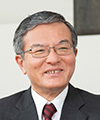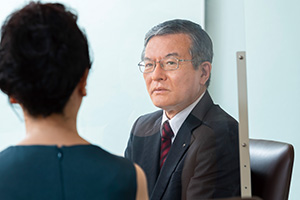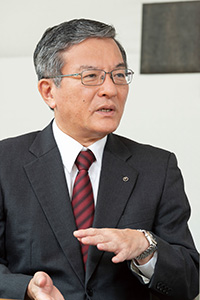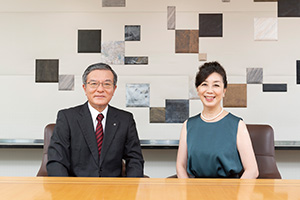 |
|
|
|
|
|
View from the Top Vol. 20, No. 8, pp. 1–5, Aug. 2022. https://doi.org/10.53829/ntr202208tp1
People Are the Starting Point for All New Services and ProductsAbstractWith people at its core, the NTT Group defines the capabilities it aims to achieve as service expertise, technical expertise, and intelligence. All 330,000 NTT Group employees¡½working in approximately 90 countries and regions¡½are accelerating the group¡Çs self-transformation into a new NTT that is open, global, and innovative to be valuable to all stakeholders, including customers, shareholders, local communities, and employees. We asked Akira Shimada, president and chief executive officer of NTT, who took up the post in June 2022, about the details of the guidelines that he announced at his inaugural press conference and his thoughts on what it means to be a top executive. Keywords: customer experience, employee experience, carbon neutrality Accelerating our self-transformation and delivering new experiences and value to our customers—Congratulations on your new position. You must be busy every day with press conferences and interviews. First, could you tell us about your vision for NTT? As I mentioned at my inaugural press conference, I will first work on creating better CX (customer experience) through better EX (employee experience) in the current business environment. All 330,000 employees of the NTT Group worldwide are required to focus on our customers and create new experiences and value for them. Therefore, the top management needs to create an environment in which all employees are motivated to meet this requirement. Although our business started in the field of infrastructure, we are now expanding into a wide range of businesses such as solutions and applications. For our customers, being constantly connected via telecommunications is something they take for granted that goes unnoticed, like the air we breathe. However, our employees understand the importance of their work, introduce new technologies and mechanisms, and maintain and inspect equipment and facilities daily to ensure stable connections. I recognize that this steady effort is one of NTT’s strengths. I believe that people are the starting point for all the services and products that NTT creates. Services and products do not arise spontaneously; they are created by employees in charge of research and development (R&D), maintenance and inspection, and customer service at call centers and stores who strive to satisfy customers through their originality and ingenuity when carrying out their assigned missions. In other words, people are the source of our success. —There are high expectations for the services and products that will be created by the increased satisfaction of your employees, right? Naturally, we face competition. If, despite our best efforts, we cannot satisfy our customers, other companies will replace us. To prevent this, we need to constantly check whether our customers are satisfied with the services and products that we provide for them. We must always understand the viewpoint of our customers and work to improve what can be improved—even if only slightly. We must also impress customers with new services and products, so we will attempt to provide services that give them a glimpse of the future. It is important to challenge the status quo by creating something new to adapt to an ever-changing world. To build a foundation to support such efforts and boost employee morale, I want to create a system that recognizes employees who work hard and acquire new skills, improves the expertise of all employees, and reforms working styles. As I mentioned at my inaugural press conference, due to the COVID-19 pandemic, many of our employees have experienced remote working. Employee surveys have confirmed some positive effects of remote working, including reduced commuting burdens and improved satisfaction among employees raising children. Remote working is allowed according to the desire of the individual employee because of the variable nature of an employee’s job, experience and skills, and living environment. However, much work is completed by a team rather than one person. I, therefore, want our employees to work in a hybrid fashion combining remote and office-based working in accordance with each employee’s situation. That said, I think it is essential for new employees to learn how to do their jobs, and for that reason, I hope that they come to the office to receive guidance from their supervisors and peers in person and try to build relationships with colleagues.
Reducing electricity usage through IOWN and achieving carbon neutrality—Social contribution is an important objective for the NTT Group. Could you tell us about some of the initiatives that you will be focusing on? The NTT Group is promoting various initiatives to create a sustainable society, and we consider energy a particularly important social issue. To address this issue, the NTT Group aims to achieve carbon neutrality by 2040. As the amount of communication continues to increase with the spread of the Internet and smartphones, the information and telecommunications industry currently consumes nearly 1% of Japan’s commercial electricity consumption, and much of its greenhouse-gas emissions stem from electricity consumption. Against that backdrop, we have set our carbon-neutrality goal ten years ahead of the one set by the Japanese government. I hope people will consider our declaration of achieving carbon neutrality by 2040 as our determination to make a concerted effort by all our employees. We will achieve this goal by reducing power consumption using photonics-based technology in everything from networks to terminals in the Innovative Optical and Wireless Network (IOWN) and developing renewable energy. —Society also has high expectations for NTT’s R&D. Would you tell us about some of NTT’s world-leading or unique achievements, including IOWN? A representative example of our achievements is photonics-electronics convergence technology, which is a component of IOWN. Currently, optical fiber is used for transmission lines and wiring between devices. However, photonics-electronics convergence technology takes this material a step further and uses photonics instead of electronics to connect circuit boards within a device, between chips and other parts on the board, and ultimately even within chips. This technology lowers power consumption and increases processing speed. It is a long-term goal, and we first plan to achieve the board-to-board optical interconnection by 2025. We have also achieved a variety of world-class research results concerning, for example, artificial intelligence and quantum computers, which are familiar to everyone these days. One of our unique achievements is our research in the field of sports science, which contributed to the Japanese women’s softball team winning the gold medal at a major international sporting event held in Tokyo in 2021. By making it possible to “train the brain and win the competition,” our researchers took a practical approach in conjunction with academic research. In particular, they developed a batting-training system that combines videos of pitchers with a pitching machine that can analyze the pitch quality of opposing pitchers and throw a variety of pitches based on the analysis results and provided the system at training camps for the team. We regularly present many of our achievements at the NTT R&D Forum, which is currently held only once a year and is by invitation only, so only a limited number of people can attend. Since these research achievements involve technologies that are not widespread, it may be difficult for the general public to understand them. Therefore, I believe it is necessary to explain our research results in an easy-to-understand manner to disseminate them in society. To that end, we are considering shooting and distributing videos of my visits to our laboratories to talk with experts and researchers in various fields.
Realizing that “what goes around comes around” while in the US—What path did you take from the time you joined the company until you were appointed president? Did you set your sights on your current position? When many people my age became working adults, they probably joined companies intending to reach the top. However, even though they had such a passionate aspiration, I don’t think it is realistic. That was the case for me. After joining Nippon Telegraph and Telephone Public Corporation in 1981, I started working in sales at a telephone exchange. The following year, I completed training in outdoor and indoor maintenance and then training in a department handling data communications, which were the main businesses of NTT at the time. After that, I was in charge of planning budgets at the Planning Department of the head office. Next, I became assistant manager of the Sales Section at the Makuhari Telegram and Telephone Office, seconded to the then Economic Planning Agency of Japan. I then was appointed assistant manager of the Human Resources Planning Section at the head office. Afterwards, I was appointed manager of the Planning Section of the Labor Department of the Tokai Branch Office before being transferred to NTT Europe in London in 1995. When I was in London, NTT was preparing to enter the international telecommunications market. Our first line was between Tokyo and London, and it started operating as an international data-communication line for the then Sakura Bank (now Sumitomo Mitsui Banking Corporation) on September 18, 1997. That was NTT’s first global network business. As someone who has been involved in the global business from its very beginning, I am proud when I think about the fact that it has grown from almost zero sales to over a two trillion yen annual sales. I have worked for about 13 different companies within the NTT Group, both domestically and internationally, before assuming my current position. I have moved house 13 times. My 40-plus years in the profession have not all been good ones, and I’ve had some tough times along the way. An example was when a US company we acquired was on the verge of financial collapse due to the bursting of the Internet bubble in the late 1990s and we had to streamline its operations to rebuild. At that time, I was working at the company branch in the US, and my views on streamlining policies did not match those of the company’s top management, so I asked for suggestions from the head office in Japan. However, others discovered that I had created the original draft concerning those suggestions, and my relationship with the top management deteriorated further. That situation made it harder to do my job, but I had no choice but to carry on. From then on, I worked on increasing sales by supplying products to Japan as an OEM (original equipment manufacturer), and gradually gained the trust of several department heads, making my job easier. That experience made me keenly aware of the challenges of corporate communication and the fact that even if a company is a wholly owned subsidiary, employees of the company do not always listen to the opinions of the parent company. It also made me realize the truth in the saying “what goes around comes around.”
—Thank you for sharing your experiences with us. Could you tell us about your beliefs as a top executive based on those experiences? I believe it is essential for an organization involving many people to have good communication so that people can move in a positive direction. As a leader who works with the 330,000 employees of the NTT Group, I want to value people. A leader cannot do anything alone. The appeal of the existence of a company is that it is an organization with many people. In an organization, together we can overcome what one cannot overcome alone. The role of the leader is to energize the organization to generate new ideas, and to fulfill that role, should not take an arrogant and formal attitude. If you take such an attitude, no one will want to talk to you. I want to be open-minded to encourage anyone to talk with me. For those at the top management, it is our job to “discover” people. There may be people in our group who have a variety of ideas but go unnoticed. It is important to seek out such people. We must also transform our group by combining completely different organizations and people with various skills to promote innovation. Interviewee profileCareer highlightsAkira Shimada joined Nippon Telegraph and Telephone Public Corporation (now NTT) in 1981. He became vice president of the Corporate Strategy Planning Department of NTT in 2007; senior vice president and member of the Board of NTT EAST in 2011; senior vice president, head of the General Affairs Department, and member of the Board of NTT in 2012; executive vice president, head of the General Affairs Department, and member of the Board of NTT in 2015; and senior executive vice president and representative member of the Board of NTT in 2018. He has held his current position since June 2022. |
|












